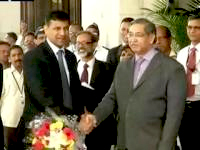 Mumbai, Sept 5: New Reserve Bank of India (RBI) Governor Raghuram Rajan on Wednesday announced a slew of reforms to “protect” the rupee and emphasised that though Indian economy faced challenges, it was fundamentally strong.
Mumbai, Sept 5: New Reserve Bank of India (RBI) Governor Raghuram Rajan on Wednesday announced a slew of reforms to “protect” the rupee and emphasised that though Indian economy faced challenges, it was fundamentally strong.He promised bold reforms and predictability in policy, saying the medium-term fundamentals of the Indian economy “remain strong” though it was passing through challenging times and it should not be called a crisis.
According to him, the recent “gloom and doom” was overdone. “We certainly do not need false optimism. Our task today is to build a bridge to the future, over the stormy waves produced by global financial markets. I have every confidence we will succeed in doing that.”
Shortly after he took over as the RBI’s 23rd governor, Rajan, 50, addressed the media with a prepared statement in which he laid out a detailed road map for his innings, which he called a “big initial package”. He also rescheduled by a few days the much-anticipated first monetary policy statement to September 20, so that he gets “enough time to consider all major developments in required detail”.
Reflecting a shift in the approach from his predecessor D Subbarao, who had serious differences with the government of late, Rajan said the primary role of the bank is ensuring monetary stability to sustain confidence in the value of the rupee.
“Ultimately, this means low and stable expectations of inflation, whether that inflation stems from domestic sources or from changes in the value of the currency, from supply constraints or demand pressures,” he said.
At the same time, Rajan stressed that the RBI has two other important mandates: “Inclusive growth and development and financial stability.”
He said he would focus on “transparency and predictability” in the central bank’s functioning.
“At a time when financial markets are volatile, and there is some domestic political uncertainty because of impending elections, the Reserve Bank of India should be a beacon of stability,” he said.
“That is not to say we will never surprise markets with actions. A central bank should never say never, but the public should have a clear framework as to where we are going, and understand how our policy actions fit into that framework,” Rajan said.
Further, the new governor set up a number of committees for revising and strengthening monetary policy framework, financial stability, financial inclusion, NPAs and an outside panel of experts headed by former governor Bimal Jalan to screen applications for new bank licences.Rajan said the new bank licences would be issued around January next year.





Comments
Add new comment